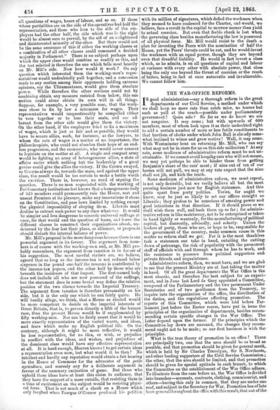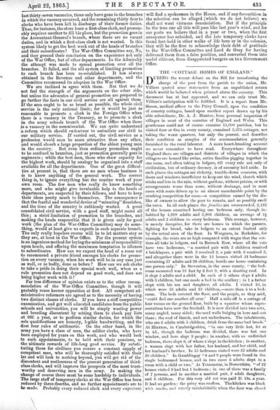THE WAR-OFFICE REFORMS.
I S good administration—say a thorough reform in the great departments of our Civil Service, a method under which we shall keep no more cats than catch mice, no horses but such as pull at the coach—possible under parliamentary government ? Quien aabe ? So far as we do know wo are not sanguine. It may come ; but with upwards of Ma members, most of whom look upon it as their undoubted right to add a certain number of more or less futile constituents to. that burthen of clerks under which John Bull is already some- what inclined to wince and grow restive! Well, it may come.. With Westminster bent on returning Mr. Mill, who can say what may not be in store for us on this side millenium At any rate, some modicum of administrative reform must be not un- attainable. If we cannot avoid keepilig cats who will not mouse,. we may yet perhaps be able to hinder these from getting Benjamin's share of the cats' meat; if nine out of ten of our horses will not pull, we may at any rate expect that the nine shall not jib, and kick the tenth.
Some modicum of administrative reform, we must repeat, is not only desirable, but we verily believe all but the most. pressing business just now for English statesmen. And this quite apart from party politics. Tories, for aught we know, may be just as likely to set our offices straight as. Liberals ; they profess to be conscious of amazing power and good intentions in that direction. If it should prove so we- shall wish them well, and back them up so far ; for adminis- trative reform is like matrimony, not to be enterprised or taken, in hand lightly or wantonly, for the manufacturing of political capital, but discreetly, advisedly, and soberly. Unless the of party' those who are, or hope to be, responsible for the government of the country, make common cause in this matter no reform shall we get. For it is the most thankless task a statesman can take in hand, entailing the cutting down of patronage, the risk of popularity with the permanent. staff of officials with and through whom he has to work, and. the resistance to pressure from political supporters and private friends and acquaintance. Administrative reform, then, we must have, and we are glad to see that the present Ministry are at last taking the matter in hand. Of all the great departments the War Office is the most chaotic, and therefore the best subject for an experi- ment, and in June last Lord de Grey appointed a Committee, composed of the Parliamentary and the two permanent Under Secretaries and of two gentlemen from the Treasury, te inquire into the organization of the office, the distribution of the duties, and the regulations affecting promotion. The reports of this Committee, which were laid before Par- liament just before the Easter recess, have put in issue the- principles of the organization of departments, besides recom- mending certain specific changes in the War Office. The latter depend upon the former. If the principles which the Committee lay down are unsound, the changes they recom- mend ought not to be made; so our first business is with the- principles. What is the true theory of promotion in an office ? There- are principally two, one that the area should be as broad as possible, and that promotion should be given for general merit, which is held by Sir Charles Trevelyan, Sir S. Northcote, and other leading supporters of the Civil Service Commission; the other, that the area should be limited, and that promotion should be given for special aptitude in each branch, to which the Committee on the establishment of the War Office adhere.. To illustrate from the case before us, the War Office is divided into branches—accounts, contracts, clothing, commissariat, and others—having this only in common, that they are under one roof, and subject to the Secretary for War. Promotion has oflate been general throughout the office with this result, that out of the last thirty-seven vacancies, three only have gone in the branches in which the vacancy occurred, and the remaining thirty-four to clerks who have been left in discharge of their former duties. 'Thus, for instance, the store loses a first-class clerk, and presum- ably requires another to fill his place, but the promotion goes in the Accountant-General's branch, where there are no vacant duties, and in which a first-class clerk is not wanted. Is this system likely to get the best work out of the heads of branches and their subordinates? The War-Office Committee say, No, and they ground their conclusion on the experience not only of the War Office, but of other departments. In the Admiralty the attempt was made to spread promotion over all the branches. It failed, and the old system of limiting promotion to each branch has been re-established. It has always obtained in the Revenue and other departments, and the Committee recommend its adoption in the War Office. We are inclined te agree with them. Not that we do not feel the strength of the arguments on the other side, but unless the advocates of general promotion are prepared to go further the facts in our civil service are all against them. If the area ought to be as broad as possible, the whole civil service is the only rational limit; for it would be just as reasonable to promote a clerk in the Foreign Office when there is a vacancy in the Treasury, as to promote a clerk in the army schools branch of the War Office when there is a vacancy in the commissariat. We can quite understand a reform which should endeavour to assimilate our civil to our military service. If carried out, the civil service as a profession would soon be more attractive than any other, and would absorb a large proportion of the ablest young men in the country. But even then ordinary promotion ought to be confined to branches, just as promotion generally goes in regiments ; while the best men, those who show capacity for the highest work, should by analogy be organized into a staff available for all the departments. One of the great difficul- ties at present is, that there are no men whose business it is to know anything of the general work. The correct thing is, to ignore everything but the routine work of your own room. The few men who really do know something more, and who might give invaluable help to the heads of 'departments, are suspected by their fellows, and have to keep their ideas pretty much to themselves. The consequence is that the fearful and wonderful device of "minuting" flourishes, and the time of the country is ruthlessly wasted. A great 'consolidated civil service, with a good staff, might mend all this ; a strict limitation of promotion to the branches, and making the heads responsible that it is given only for good work (the plan of the War-Office Committee) may do some- thing, would at least give us experts in each separate branch. The only really hopeless course will be to let matters stay as they are, at least in the War Office. For the present system is an ingenious method for laying the minimum of responsibility upon heads, and offering the maximum temptation to idleness to subordinates. How can we expect the head of a room not to recommend a private friend amongst his clerks for promo- tion on every vacancy, when his work will be in any case just as well, or as badly, done as before ? How can we ask clerks to take a pride in doing their special work well, when as a rule promotion does not depend on good work, and does not bring higher work with it?
Far less difference of opinion exists as to the other recom- mendation of the War-Office Committee, though it will probably rouse keener opposition at first. All competent ad- ministrative reformers are agreed as to the necessity of having two distinct classes of clerks. If you have a stiff competitive -examination, and get well educated candidates from the public schools and universities, you will be simply wasting power and breeding discontent by setting them to check pay lists at 90/. a year, or to perform similar duties, for which the sole qualifications are honesty, legible handwriting, and the drat four rules of arithmetic. On the other hand, in the army you have a class of men, the soldier clerks, who have been employed for years on this work, and who would look to such appointments, to be held with their pensions, as the ultimate rewards of life-long good service. By substi- tuting these for civilians you ensure a constant supply of competent men, who will be thoroughly satisfied with their let and will look to nothing beyond, you will get rid of the discontent and restlessness of the present generation of third- class clerks, and will improve the prospects of the most trust- worthy and deserving men in the army. In making the change of course there must be some hardship to individuals. The large staff of temporary clerks at the War Office has been reduced by three-fourths, and no further appointments are to be made. Probably every reduced clerk and every expectant will find a spokesman in the House, and if any favouritism in the selection can be alleged (which we do not believe) we shall not want virtuous denunciation. But if the principle be the true one all this will pass like last year's wind, and for our parts we believe that in a year or two, when the first annoyance has subsided, and the late temporary clerks have found foot-hold in other walks of life here or in the colonies, they will be the first to acknowledge their debt of gratitude to the War-Office Committee and Lord de Grey for having delivered them from a false position, and converted them into useful citizens, from disappointed hangers-on to a Government Office.































 Previous page
Previous page